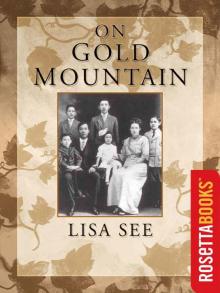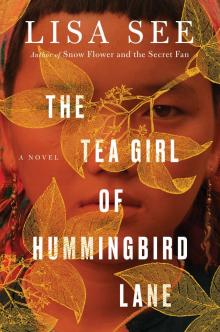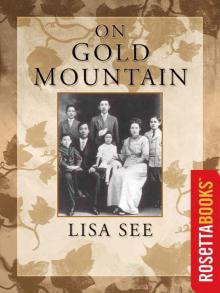The Tea Girl of Hummingbird Lane Read online
Thank you for downloading this Simon & Schuster ebook.
* * *
Get a FREE ebook when you join our mailing list. Plus, get updates on new releases, deals, recommended reads, and more from Simon & Schuster. Click below to sign up and see terms and conditions.
CLICK HERE TO SIGN UP
Already a subscriber? Provide your email again so we can register this ebook and send you more of what you like to read. You will continue to receive exclusive offers in your inbox.
In memory of my mother, Carolyn See
AUTHOR’S NOTE
When the novel starts, in 1988, tea leaves picked in the mountains of Yunnan sold for 4 yuan a kilo (approximately 50 cents U.S. in today’s money). The yearly income for tea farmers averaged 200 yuan (around $25 U.S.) a month.
Please note there are different spellings and pronunciations for the dark tea category known as Pu’er: Pu’erh, according to the Wades-Giles system of transliteration of Chinese devised by missionaries in the nineteenth century; Puerh in Taiwan; Pu’er in the People’s Republic of China’s pinyin system, which was officially adopted by the United Nations in 1986; and Ponay or Bonay in Cantonese.
When a son is born,
Let him sleep on the bed,
Clothe him with fine clothes,
And give him jade to play . . .
When a daughter is born,
Let her sleep on the ground,
Wrap her in common wrappings,
And give her broken tiles to play . . .
Book of Songs (1000–700 B.C.)
PART I
THE AKHA WAY
1988–1990
A DOG ON THE ROOF
“No coincidence, no story,” my a-ma recites, and that seems to settle everything, as it usually does, after First Brother finishes telling us about the dream he had last night. I don’t know how many times my mother has used this praising aphorism during the ten years I’ve been on this earth. I also feel as though I’ve heard versions of First Brother’s dream many times. A poor farmer carries freshly picked turnips to the market town to barter for salt. He takes a misstep and tumbles down a cliff. This could have ended in a “terrible death” far from home—the worst thing that can happen to an Akha person—but instead he lands in the camp of a wealthy salt seller. The salt seller brews tea, the two men start talking, and . . . The coincidence could have been anything: the salt seller will now marry the farmer’s daughter or the farmer’s fall protected him from being washed away in a flood. This time, the farmer was able to trade with the salt seller without having to walk all the way to the market town.
It was a good dream with no bad omens, which pleases everyone seated on the floor around the fire pit. As A-ma said, every story, every dream, every waking minute of our lives is filled with one fateful coincidence after another. People and animals and leaves and fire and rain—we whirl around each other like handfuls of dried rice kernels being tossed into the sky. A single kernel cannot change its direction. It cannot choose to fly to the right or to the left nor can it choose where it lands—balanced on a rock, and therefore salvageable, or bouncing off that same rock into the mud, becoming instantly useless and valueless. Where they alight is fate, and nothing—no thing anyway—can change their destinies.
Second Brother is next in line to tell his dream. It is ordinary. Third Brother recites his dream, which is worse than dull.
A-ba nudges me with his elbow. “Girl, tell us a dream you had last night.”
“My dream?” The request surprises me, because neither of my parents has asked this of me before. I’m just a girl. Unimportant, as I’ve been told many times. Why A-ba has chosen this day to single me out, I don’t know, but I hope to be worthy of the attention. “I was walking back to the village after picking tea. It was already dark. I could see smoke rising from household fires. The smell of the food should have made me hungry.” (I’m always hungry.) “But my stomach, eyes, arms, and legs were all happy to know I was where I was supposed to be. Our ancestral home.” I watch my family’s faces. I want to be honest, but I can’t alarm anyone with the truth.
“What else did you see?” A-ma asks. In our village, power and importance go in this order: the headman; the ruma—the spirit priest—who keeps harmony between spirits and humans; and the nima—the shaman—who has the ability to go into a trance, visit the trees God planted in the spirit world to represent each soul on earth, and then determine which incantations can be used to heal or enhance vitality. These men are followed next by all grandfathers, fathers, and males of any age. My mother is ranked first among women not only in our village but on the entire mountain. She is a midwife and so much more, treating men, women, and children as they pass through their lives. She’s also known for her ability to interpret dreams. The silver balls that decorate her headdress tremble, catching the firelight, as she waits for my response. The others bend their heads over their bowls, nervous for me.
I force myself to speak. “I dreamed of a dog.”
Everyone prickles at this revelation.
“We allow dogs to live among us for three reasons,” A-ma says reassuringly, trying to settle the family. “They are essential for sacrifices, they alert us to bad omens, and they are good to eat. What kind was yours?”
I hesitate once again. The dog in my dream stood on our roof, alert, his snout pointed upward, his tail erect. To me, he looked as though he were guarding our village, and seeing him made me feel confident that I would make it home safely. But the Akha people believe . . .
A-ma gives me a stern look. “Dogs are not human, but they live in the human world. They are not of the spirit world, but they have the gift of seeing spirits. When you hear a dog howl or bark in the night, you know he has spotted a spirit and hopefully scared him away. Now answer me, Girl,” she says, pushing her silver bracelets up her wrist. “What kind was yours?”
“The whole family was sitting outside when the dog began to bark,” I say, when I know perfectly well that dreaming of a dog on the roof means that he hasn’t done his job and that a spirit has sneaked past the protection of the village’s spirit gate and is now roaming among us. “He frightened off an evil spirit. A-poe-mi-yeh rewarded him by giving everyone in our family a chicken to eat—”
“Our supreme god gave every man and woman his or her own chicken?” First Brother scoffs.
“And all the children too! Every single person had a whole chicken—”
“That’s impossible! Meaningless! A fabrication!” First Brother looks at A-ba indignantly. “Make her stop—”
“So far I like her dream,” A-ba says. “Go on, Girl.”
The more pressure I feel to continue my story, the easier it becomes to lie. “I saw birds in a nest. The babies had just broken through their shells. The a-ma bird tapped each one gently with her beak. Tap, tap, tap.”
A moment passes as my parents and brothers ponder this addition. As A-ma searches my face, I try to keep my expression as still as a bowl of soy milk left out overnight. Finally, she nods approvingly.
“Counting her babies. New lives. A protecting mother.” She smiles. “All is good.”
A-ba stands up, signaling that breakfast is done. I’m not sure what’s more troublesome—that A-ma can’t see everything inside my head as I always thought she could or that I’ve gotten away with my fabrications. I feel pretty terrible until I remind myself that I prevented my family from the worry my dream would have caused them. I lift my bowl to my lips and slurp down the last of my broth. A few bitter mountain leaves slip into my mouth along with the fiery liquid. Chili flakes burn their way to my stomach. For as long as that heat lasts, I’ll feel full.
* * *
When we leave the
house, stars still glitter above our heads. I carry a small basket on my back. My other family members have large baskets slung over their shoulders. Together we walk along the dirt lane that divides Spring Well Village, which has about forty households and nestles in one of the many saddles on Nannuo Mountain. Most of the homes are sheltered by old tea trees. The tea terraces and gardens where we work, however, are outside the village.
We join our neighbors, who live four houses away from us. The youngest daughter, Ci-teh, is my age. I could find my friend anywhere, because her cap is the most decorated of any girl’s in Spring Well. In addition to tea, her family grows pumpkins, cabbages, sugarcane, and cotton. They also cultivate opium, which they sell to the spirit priest to use in ceremonies and to A-ma to use as a medicine for those suffering from the agony of broken bones, the torment of the wasting disease, or the mental anguish that comes from losing a loved one. The extra money Ci-teh’s family earns means they can sacrifice more and larger animals for offerings, which in turn means that the customary shared cuts of meat that are given to everyone in the village are more and larger too. Ci-teh’s family’s wealth also means that her cap is decorated with lots of silver charms. Apart from these differences, Ci-teh and I are like sisters—maybe closer than sisters, because we spend so much time side by side.
As we continue toward our work, we leave the last house behind and proceed a little farther until we reach the spirit gate. Carved figures of a woman and a man are mounted on the posts. The woman has huge breasts. The man has a penis that is as thick as timber bamboo, longer than my entire height, and sticking straight out. Whittled birds of prey and vicious dogs hang from the crossbeam. Be warned. If someone doesn’t pass through the gate properly—touching it perhaps—then something terrible can happen, like a death. We must all be mindful of the gate.
We begin to climb. Ci-teh and I chatter, catching up as though many weeks have passed instead of one night.
“I worked on my embroidery before bed,” Ci-teh confides.
“I fell asleep before my a-ba had his pipe,” I tell her.
“Hot water or tea with breakfast?”
“Tea.”
“Dreams?”
I don’t want to tell her any of that. We have a long way to go and the only other way to make the time pass quickly is through games and challenges.
“How many different parasites can you spot on the trees before we get to that boulder?” I hoot.
Nine, and I win.
“How are you doing with your weaving?” Ci-teh asks, knowing I haven’t shown a talent for it.
“So boring!” I holler, and the men look back at me disapprovingly. “Let’s see how many jumps it will take from this rock to that one way up there.”
Seven, and I win again.
“Last night, Deh-ja”—that would be Ci-teh’s sister-in-law—“said she wants to have a son.”
“There’s nothing new with that one.” I point to a little rise. “Bet I can beat you to the top.”
My feet know this route well, and I hop from rock to rock and jump over exposed roots. In places, the dirt is powdery between my toes. In other spots, pebbles poke at the soft underparts of my arches. Since it’s still dark, I sense more than see the old tea, camphor, ginkgo, and cassia trees, as well as stands of bamboo, towering around me.
I win again, which nettles Ci-teh. But that happens between sisters too. Ci-teh and I are close, but we compete against each other . . . constantly. I won our games today; she reminded me she’s better at embroidery and weaving. Our teacher says I could prove I’m smart if I worked a little harder; he would never say that about Ci-teh.
“See you at the tea collection center,” I say when Ci-teh follows her a-ma onto another path. I linger—watching them scramble up a steep stretch of mountain, their empty baskets bouncing on their backs—and then I skip ahead to catch up to A-ma.
After a half hour of walking, the black of night begins to fade and the sky turns pale. Clouds catch tints of pink and lavender. Then everything brightens when the sun crests the mountain. The cicadas waken and begin to trill. And still we climb. My a-ba and brothers maintain distance ahead of us so they can have their man talk. A-ma is as strong as any man, but she takes her time, looking about for herbs and mushrooms she can use in her potions. First Sister-in-law has stayed home with the children too young to pick tea and too big to be carried by their mothers, but my second and third sisters-in-law accompany us with their babies tied to their bosoms as they too forage, searching the moist forest floor for anything we might take home to put in our dinner soup.
We reach First Brother’s tea terraces at last. I move slowly between the tightly packed rows of bushes, scanning the outermost branches for the bud and two, maybe three, leaves that begin to unfurl as the sun’s rays warm them. I gently nip the tiny cluster between my thumbnail and the side of my forefinger above the first joint. My thumbnail is stained and the little pad of flesh callused. I’m already marked as a tea picker.
After two hours, A-ma comes to me. She runs her hands through my leaves, fluffing and inspecting them. “You’re very good, Girl, at finding the choicest bud sets. Maybe too good.” She glances in A-ba’s direction a few terraces away, then leans down and whispers, “Pick a little faster. And you can take some of the older and tougher leaves. We need more leaves, not just ideal bud sets, from each bush.”
I understand. More leaves means more money to be paid by the tea collection center. When my basket is full, I find First Brother, who transfers my pickings into a burlap sack, and the process begins again. We break for a lunch of rice balls rolled in dried moss, and then pick all through the afternoon. I stay close to my mother, who sings to keep us in the rhythm of picking and to remove our minds from the heat and humidity. Finally, A-ba calls, “Enough.” We gather at the spot where First Brother has been consolidating our harvest. The last leaves are packed into burlap sacks. Then each sack is strung with ropes and a flat board. A-ma mounts the smallest one on my back, wraps the ropes over my shoulders, and secures the board on my forehead. All this is to help us carry the weight evenly, but the pull of the ropes on my shoulders and the press of the wood against my forehead are instantly painful.
Once the others have their sacks on their backs and our picking baskets have been bound together for us to retrieve on our way home, we begin the two-hour journey to the tea collection center. We’re all aware we must hurry, but our pace can only be slow. One sure foot after another sure foot. We climb up and over more tea terraces, each one seemingly steeper than the last. And then we’re back in the forest, which has engulfed forsaken tea tree groves and gardens. Vines wrap around the trunks, which have become homes to orchids, mushrooms, and parasites like crab’s claw. How old are the trees? Five hundred years old? A thousand years old? I don’t know the answers. What I do know is that selling leaves from them was abandoned long ago. Only families like ours use the leaves from trees like these for at-home drinking.
By the time we reach the tea collection center, I’m so tired I want to cry. We enter through big gates into a courtyard. My vision flits around the open space, looking for Ci-teh’s distinctive cap. We Akha have our own style of dress. So too do the Dai, Lahu, Bulang, and the other tribes who live here with us. Everyone wears their work clothes, but every headdress, scarf, and cap is decorated, according to the traditions of that clan and the individual taste and style of each woman or girl. I don’t spot Ci-teh. Her family must have come and gone already. They might even be home by now, eating their supper.
My stomach calls to me, aggravated yet entranced by the smells coming from the food vendor stalls. The perfume of skewered meat on an open flame fills my head. My mouth waters. One day I’ll get to taste one of those. Maybe. Occasionally, we treat ourselves to scallion pancakes that an old Dai woman sells from a cart just to the left, inside the tea collection center courtyard. The aroma is enticing—not as rich as the grilled meat but cleanly fragrant with the smell of fresh eggs.
A-ma
, my sisters-in-law, and I squat in the dirt as my a-ba and brothers take our bags through a set of double doors that lead to the weighing area. On the other side of the courtyard, I spot a boy about my age, lingering by a mountain of burlap bags filled with tea waiting to be transported to the big city of Menghai, where it’ll be processed in a government-run factory. His hair is as black as my own. He too is barefoot. I don’t recognize him from school. But I’m less interested in him as a person than I am in the steaming scallion pancake he holds in his tea-stained fingers. He looks around to make sure no one is watching—obviously missing me—before ducking out of sight behind the burlap mound. I get up, cross the courtyard, and peek around the corner of the wall of tea.
“What are you doing back there?” I ask.
He turns to me and grins. His cheeks are shiny with oil. Before he has a chance to speak, I hear A-ma calling.
“Girl! Girl! Stay near me.”
I scurry back across the courtyard, reaching my mother just as A-ba and my brothers exit the weighing area. They don’t look happy.
“We were too late,” A-ba says. “They already bought their quota for the day.”
I moan inwardly. We’re a family of eight adults and many children. It’s hard to live on what we earn during the ten days a year of prime tea picking, the two secondary picking times of another ten days each, plus what rice and vegetables we grow and what A-ba and my brothers provide through hunting. Now we’ll have to take the leaves home, hope they stay fresh, and then tomorrow morning—early-early—climb back up here and sell them before rotating to Second Brother’s tea garden to do our work for the day.
A-ma sighs. “Another double day tomorrow.”
The sisters-in-law bite their lips. I’m not looking forward to walking here twice tomorrow either. But when my second and third brothers won’t meet their wives’ eyes, I realize even worse news is coming.

 On Gold Mountain: The One-Hundred-Year Odyssey of My Chinese-American Family
On Gold Mountain: The One-Hundred-Year Odyssey of My Chinese-American Family Snow Flower and the Secret Fan
Snow Flower and the Secret Fan Peony in Love
Peony in Love Flower Net
Flower Net Dragon Bones
Dragon Bones Shanghai Girls
Shanghai Girls Dreams of Joy
Dreams of Joy The Island of Sea Women
The Island of Sea Women The Tea Girl of Hummingbird Lane
The Tea Girl of Hummingbird Lane China Dolls
China Dolls The Interior
The Interior On Gold Mountain
On Gold Mountain